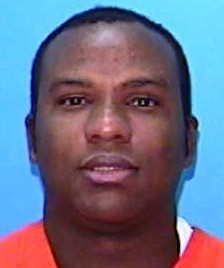DC#
764970
DOB: 04/09/67
Twelfth Judicial Circuit,
Sarasota County, Case #95-1588, 95-1951
Sentencing Judge: The Honorable
Harry Rapkin
Trial Attorney: Charles Williams
- Assistant Public Defender
Attorney, Direct Appeal: Douglas
S. Connor - Assistant Public Defender
Attorney, Collateral Appeal:
Peter Cannon & Daphney Gaylord – CCRC-M
Date of Offense: 06/19/95
Date of Sentence: 10/20/95
Circumstances of Offense:
Ernest Whitfield was convicted
and sentenced to death for the 06/19/95 murder of Claretha Reynolds.
In June of 1995, Ernest
Whitfield visited the home of Claretha Reynolds. While there, he asked
Reynolds, Willie Mae Brooks (who lived with Reynolds) and Estella Pierre
for money. Estella Pierre was Whitfield’s former girlfriend.
When all
three women refused, Whitfield attempted to grab Pierre’s purse.
Reynolds put Whitfield into a headlock and proceeded to throw him out of
her house. Before leaving, Whitfield exclaimed, “I am going to kill all
three of you bitches.”
In the early morning of
06/19/95, Whitfield tried to get Brooks to let him into Reynold’s home.
Brooks turned him away and went back to sleep in the room she shared
with her one-year-old child.
Whitfield then broke into Reynolds’ home
armed with a large knife. Whitfield proceeded into the bedroom where
Brooks and her child lay sleeping. He raped Brooks and motioned that he
would stab her if she made any noise.
Whitfield left Brooks and went
into the bedroom where Reynolds and her five children were sleeping. A
few moments later, Reynolds staggered into Brook’s room, asking her to
lock her door. Whitfield had stabbed Reynolds numerous times and she
told Brooks that she was dying. Brooks and one of Reynolds’ daughters
escaped through the bedroom window and ran to a neighbor’s house to call
for help.
Whitfield fled the scene and
Reynolds died soon after the police arrived. After his arrest,
Whitfield confessed to stabbing Reynolds and showed authorities to the
murder weapon. Whitfield also admitted to being high on crack cocaine
at the time of the crime.
*****
Trial Summary:
07/07/95 The defendant
was indicted on the following charges:
Count I: First-Degree
Murder
Count II: Armed Burglary
Count III: Sexual Battery
w/Deadly Weapon
09/28/95 The defendant
was found guilty on all counts charged in the indictment.
09/28/95 Upon advisory sentencing, the jury,
by a 7 to 5 majority, voted for the imposition of the death penalty.
10/20/95 The
defendant was sentenced as followed:
Count I: First-Degree
Murder - Death
Count II: Armed Burglary -
Life
Count III: Sexual Battery
w/Deadly Weapon - Life
*****
Case Information:
On 11/02/95, Whitfield filed a
Direct Appeal in the Florida Supreme Court. In that appeal, he argued
that the trial court erred in removing him from the courtroom during
jury selection. The Florida Supreme Court noted that Whitfield asked to
be removed from the courtroom. Despite Whitfield’s counsel’s request to
send him back to his cell because his behavior was instilling prejudice
in his case, the trial judge made extraordinary efforts to convince
Whitfield to stay. The Florida Supreme Court found that the trial judge
did not abuse his discretion on the issue. Whitfield also contended
that the trial court erred in admitting testimony regarding the incident
where Whitfield attempted to snatch Pierre’s purse and that the
prosecutor introduced irrelevant evidence during the penalty phase.
Whitfield additionally argued the consideration and application of
aggravating and mitigating circumstances. The Florida Supreme Court
affirmed the convictions and sentence of death on 09/11/97.
Whitfield next filed a Petition
for Writ of Certiorari in the United States Supreme Court, which was
denied on 10/05/98.
Whitfield filed a 3.850 Motion
in the State Circuit Court on 11/09/98. Whitfield raised 21 claims in
the motion all of which the court denied relief. The motion was denied
on 03/17/04.
Whitfield then filed an appeal
of the 3.850 Motion decision in the Florida Supreme Court. Whitefield
raised six claims in his appeal, five of which related to ineffective
assistance of counsel. Whitfield argued that his trial defense counsel
failed to do the following: adequately present the voluntary
intoxication defense to first-degree murder, provide a speedy trial,
call additional witnesses to corroborate his background information,
request jury instruction, and object to the prosecutor’s presentation of
nonstautory aggravators. Whitfield’s final claim was that his rights
were violated under Ake v. Oklahoma, 470 U.S. 68 (1985), by
failing to obtain an adequate mental health examination. On
11/03/05, the Florida Supreme Court denied all of Whitfield’s claims and
affirmed the Circuit Court’s denial of postconviction relief.
FloridaCapitalCases.state.fl.us
|

